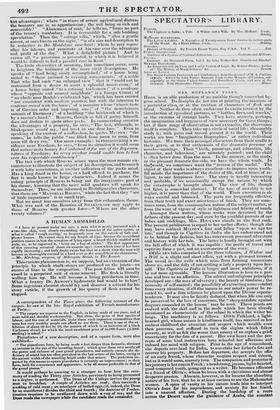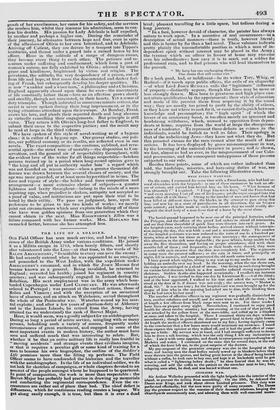MRS. HOFLAND'S TALES.
HERE is an able production of an amiable though somewhat by- gone school. Its disciples do not aim at painting the:manners of a particular class, or at the creation of characters of Ault and blood. Neither do they often endeavour to excite interest by the introduction of episodical pictures, as "battles, fires, and wrecks," or the customs of strange lands. They have scarcely, perhaps, the imagination and largeness of view necessary for these things;
but if their range of observation is not extensive, the observance itself is complete. They take up a circle of social life; thoroughly study it; with pains and travail present it to the world. Their works are true "Imaginative Biographies," or rather individual histories. We trace their principal characters from their cradle to
their grave, or to that euthanasia of the dramatis persona, of
novels—marriage. Their " birth, parentage, and education, life, character, and behaviour," are minutely painted ; and the child
is often better done than the man. In the nursery, or the study, or the pleasant domestic fire-side, we have the whole truth. In thelworld, we sometimes want the " reverse of the medal." The object of their works is always excellent—to impress upon youth- ful minds the importance of the duties of life, and at times of re- ligion, to our happiness here. The story is mostly interesting and probable, if we occasionally except the means by which the catastrophe is brought about. The view of life, though not false, is somewhat abstract. If the tone of morality is not higher, it is purer than that of the world. Their execution is al- ways careful and laboured. The parts are frequently effective, from their truth and exact minuteness of finish. They are some- times tame, from the commonplace nature of the subject matter, or front time want of vigour of style or lightness and felicity of touch.
Amongst these writers, whose works were devoured by the fathers of the present day, and even by the youthful parents of our babes and sucklings, Mrs. Hop-LAND stands in the first rank. The present publication is equal to her earlier efforts; though she may have realized MILTON'S fear and fallen "upon an age too late," and though in Captives. in India she has endeavoured not to be behind the fashion, but has interwoven personal adventure and history with her tale. The latter is hanlly brought out with the full effect of which it was capable : the perils of travel and captivity form a part, not an excrescence of the story.
Of the two tales comprised in the three volumes, A Widow and a Will is a slight and short affair, yet with a pleasant interest. The moral is—time evils which arise from forming connexions above us, and the folly of not settling a lady's property upon her- self. The Captives in India is longer and more ambitious, if it be not more agreeable. The human illustration is love as a pas- sion and love as an affection. The ethical and religious principles developed are—the uses of adversity ; the beauty of kindness ; the necessity of self-control ; the possibility of extracting some comfort from every situation, if all the means in our mind's power be re- sorted to, and a firm reliance be placed upon the Divine superin- tendence. It may also be faintly deduced, that when life can only be preserved by the loss of innocence, the " sharp antidote against disgrace concealed in the bosom may be used. These points are evolved with the skill and in the mode which has been already mentioned as characteristic of the school to whieh the writer be- longs. The machinery is as follows. Olivia Falkland, a light- hearted girl, whose nature is kindliness itself, has received in her earliest childhood the attention and respect which wealth even then procures, aud suffered in turn the slights which follow poverty, as well as felt the worse than misery of an orphan's grief, uncertainty for the fate of a parent. Her own heart and the pre- cepts of some kind instructors have schooled her affections and imbued her mind with religion. Prior to the age of womanhood, she departs over-land for India, to ascertain her father's fate and recover his property. Before her departure, she accepts the offer of an early friend, whose character inspires respect and esteem, but as it would seem, scarcely love. The companion and protector of her journey is her cousin Frank ; a heatistrong,joyous, light-hearted, good-tempered youth, going out as a writer. He becomes affianced to a friend of Olivia's, whom he loves with a chivalrous and almost desperate passion. Absence, however, so far lessens the absorbing nature of his love, that he is at least curious to see the Mahometan women. A spice of vanity in his nature leads him to interpret Olivia's fears for his imprudence, and anxiety for her friend, into a nascent affection. Daring the hardship of a route across the Desert under the guidance of Arabs, the constant
proofs of her excellencies, her cares for his safety, and the services she renders him, whilst they increase his admiration, seem to con- firm his doubts. His passion for Lady Adelaide is half expelled, by another and perhaps a higher one. During the remainder of their journey, he alternates between hope and fear, even in spite of the allusions of Olivia to her own betrothed, and to Adelaide. Arriving off Calicut, they are driven by a tempest into Tippoo's territories, and thrust under a guard into a ruined house by his officer. Here in the solitude of a range of dungeon-rooms, they become every thing to each other. The patience and re- sources under suffering and confinement, which form a part of woman's nature, are fully exhibited by Olivia ; adorned by innate grace and kindliness, heightened by virtue and religion. The privations, the solitude, the very despondency of a prison, cut off from life and hope, at first rouse the discontented and darker feel- ing of Frank, but subsequently develop his deeper qualities. He is now " a sadder and a wiser man," a philosopher and a Christian. England apparently closed upon them for ever—the uncertainty of life constantly befbre them—love as an affection grows slowly and steadily, though not unresisted, in their hearts. Yet a sense of duty triumphs. Though indicated in numerous minute actions, the secret is never spoken during their long imprisonment, or in the trying situations attendant upon their escape. At Bombay, Frank avows his love, and pleads their reported death and long absence as virtually cancelling their engagements. But principle is still victor. They return with Olivia's long-lost father to England, to submit their cases to the respective parties; and the result may be read at large in the third volume.
We have spoken of this style of novel-writing as of a bygone class: it is rather of a bygone age. Our graver studies, our poli- tics, our political economy or its results, are reflected even in our novels. The exact composition—the cautious, subdued, and reve- rential spirit—the strict tone of morality—the disposition to Con- servatism, and the general air of respectability throughout, with the evident love of the writer for all things respectable—betoken persons trained up in a period when long-rooted opinion gave to "the king and all put in authority under him" a regard which was not founded on reason alone—when a greater theoretical dif- ference was drawn between the several classes of society, and the age was more guarded, or at least more hypocritical in terms. The force and vigour of style—the bolder and freer composition and arrangement—a more extensive choice of subjects—a greater lightness and laxity throughout—belong to the minds of a more inquiring age, when prejudice is shaken, antiquity not accepted as a proof of value, and institutions are put upon their trial to be tested by their utility. We pass no judgment, here, upon the preference to be given to the two kinds of works : we merely point out circumstances which may explain the falling off of those who have won golden opinions from one generation which they cannot obtain in the next. Miss EDGEWORTH'S Ellen was a failure compared with her former works. Mrs. HOFLAND has succeeded better, because she has attempted less.





















 Previous page
Previous page